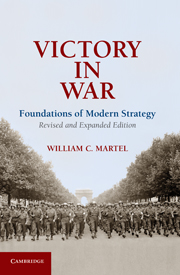Book contents
- Frontmatter
- Contents
- Preface
- VICTORY IN WAR
- 1 Introduction
- 2 Toward a General Theory of Victory
- 3 Historical Origins of Victory
- 4 Modern Origins of Victory
- 5 American Experience with Victory
- 6 American Logic of Victory
- 7 Libya
- 8 Panama
- 9 Persian Gulf War
- 10 Bosnia–Kosovo
- 11 Afghanistan
- 12 Iraq
- 13 Military Power and Victory
- 14 Implications for the Study of Victory
- Notes
- Index
9 - Persian Gulf War
Published online by Cambridge University Press: 05 June 2012
- Frontmatter
- Contents
- Preface
- VICTORY IN WAR
- 1 Introduction
- 2 Toward a General Theory of Victory
- 3 Historical Origins of Victory
- 4 Modern Origins of Victory
- 5 American Experience with Victory
- 6 American Logic of Victory
- 7 Libya
- 8 Panama
- 9 Persian Gulf War
- 10 Bosnia–Kosovo
- 11 Afghanistan
- 12 Iraq
- 13 Military Power and Victory
- 14 Implications for the Study of Victory
- Notes
- Index
Summary
After Iraqi forces invaded Kuwait on August 2, 1990, the United States deployed more than five hundred thousand troops throughout the fall and early winter to persuade Iraq to withdraw and to prevent it from invading the oil-rich Kingdom of Saudi Arabia (i.e., Operation Desert Shield). In the predawn hours of January 17, 1991, two days after a UN deadline for Iraqi withdrawal expired, U.S.-led forces attacked Iraq in what became known as the Persian Gulf War. The five-and-a-half-week air campaign (i.e., Operation Desert Storm) was followed on February 24 by an invasion with ground forces (i.e., Operation Desert Sabre) that led within days to the complete collapse of Iraqi military forces and their subsequent withdrawal. This military invasion, which involved a broad coalition of nations, was designed to forcibly remove Iraqi military forces from Kuwait and prevent the destabilization of the region under Iraqi hegemony.
As an important case of military intervention in the late-twentieth century, the 1991 Persian Gulf War constitutes a formative event in American thinking about the development of theoretical ideas about victory. The United States used military force to achieve a limited strategic victory against Iraq in response to a perceived threat to its vital interests in the Middle East, but did so without any intention of producing a transformative event in international politics.
- Type
- Chapter
- Information
- Victory in WarFoundations of Modern Strategy, pp. 231 - 251Publisher: Cambridge University PressPrint publication year: 2011

